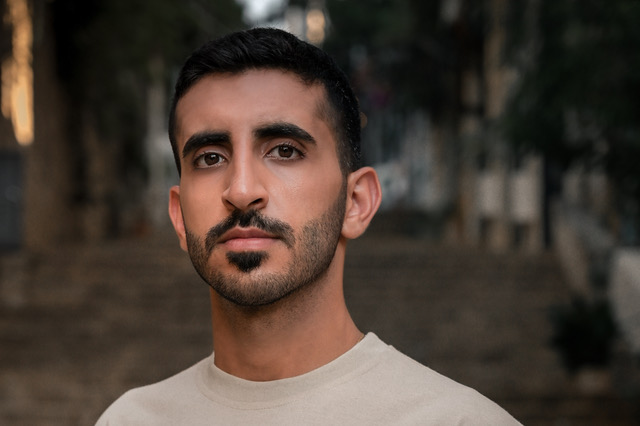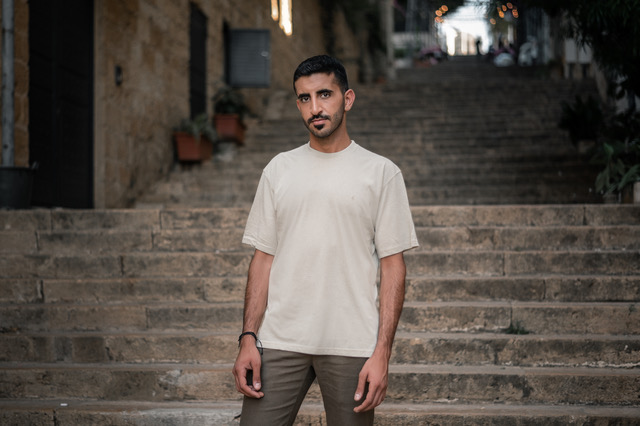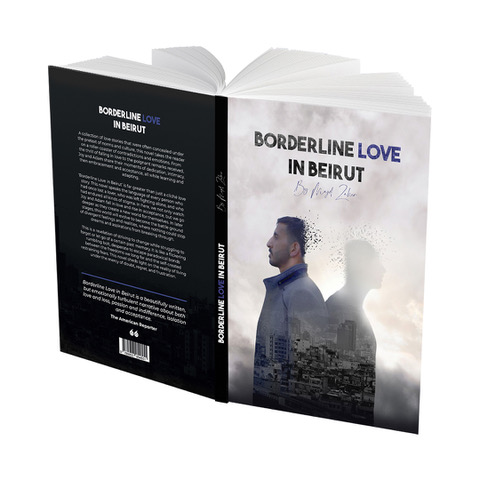Lifestyle
Strength and Vulnerability: Majd Zaher’s New Novel Looks Beyond the Veneer of Lebanese Society

- Your first book ‘Borderline Love in Beirut’ explores some challenging topics and complex characters. Can you explain the inspiration behind the story?
Growing up in a conservative family brought many challenges to my life. There was always something missing in every moment I spent living. There was a part of me that I wanted to discover and unleash yet I was afraid of judgments and backlash. Hence, I grew up as the loneliest kid in town as I had no friends and always found myself the weakest individual wherever I was. Moving out from my family’s house and starting an independent life was an eye-opening experience and the main motive that made me talk and write. I wanted this novel to be a celebration for everyone who doubted his own potential, who thought that other’s opinion would be able to dim his or her own light, and on a personal level I wanted to prove to all those who had ever bullied me that I was able to find success and peace after all.
- One of the themes you deal with is marginalization and marginalized groups. Why did you decide to address this topic?

Writing has always been a way to pave the road towards a better world and an escape from the prisons we might be existing in. Talking about marginalized groups is based on my stance that everyone has the right to exist if they are not hurting or killing anyone else; and no one has the right to decide who is eligible to enjoy life and who is not. Unfortunately, in Lebanon, we have no laws to protect vulnerable or marginalized groups. These groups include immigrants, domestic labors, queer people, or any other category. In Borderline Love in Beirut, I was no longer Majd, I ascended to Joy and Adam’s soul to show the world how difficult living life becomes when no one likes you, when everyone avoids you, and when everyone judges you for what you look like and not for the real person you are. In Lebanon, we have laws that penalize love that does not protect women from harassment. In Lebanon, our system does not give any attention to the importance of mental health and does not help marginalized groups to engage in society.
- What is the role of mental health in ‘Borderline Love’, and what are some lessons about dealing with or treating mental health issues from the story?
In Borderline Love in Beirut mental health is the crux of the story. I will not be able to say how this Borderline case will evolve yet I could tell you how it all started. Joy and Adam were the victims of a society that has never been able to embrace them the way they are. Experiencing death, upbringing challenges, and health concerns, Joy and Adam grew to become victims each in their own way. The takeaway is that offering mental health care and support for people who undergo a certain trauma, and even those who did not, is something critical. We can no longer sit still when almost every hour a Lebanese citizen ends his or her life. We cannot sit still when people still think seeking mental health care are mad. We should learn that the strongest of us can sometimes be the weakest and most vulnerable.
- Is ‘Borderline’ a cautionary tale? Or is it intended as a reflection of another kind?

I see in Borderline Love in Beirut as many tales narrated at once. This novel carries in its pages a cautionary and reflective approach. At many parts of the story when I discussed Joys struggles with loneliness, self-hate and first love I was narrating many past incidents. However, in other pages, I detached myself from this reality and decide to go the extra mile and tell others how destructive it would be for anyone to fall in love before loving himself or herself, or how painful does it become when you don’t praise your uniqueness, or you don’t embrace yourself before listening to people’s judgments.
- The book is set in contemporary Beirut and focuses primarily on young characters. How do you perceive your own society in Lebanon in terms of some of these issues, including marginalized groups and mental health issues? What would you hope for the future of Lebanon in terms of societal relations and acceptance?
In Lebanon, the lifestyle is not bearable anymore but I’m still hopeful of what is coming next because I believe one day my people will wake up to realize that coexisting and accepting the other is the only way to guarantee long-lasting peace and prosperity. It is difficult to find words to describe Lebanese society, but I will say that it is strange and paradoxical. For example, if you go to certain areas in Beirut, you’ll see people of different backgrounds enjoying their lives without the essence of discrimination and stigma. However, if you would leave the city for a less than five-minute drive, you will see the opposite. My wish and sincere hope for the future is to have a safe place for all people to live in Lebanon. To have laws that do guarantee the rights of the weak, and more laws to ensure gender equality. I do hope as well more effort will be done to abolish the rules that penalize love and strengthen the rifts in society.
- The past year has been incredibly hard for Lebanon, and the world. What do you hope to impart, through ‘Borderline Love’ to young Lebanese who might have struggled through the August 4th explosion, COVID, and other major obstacles?
My message here is for those who have struggled and continue to struggle, for those who have lost and learned, for those who are still seeking to find a path to a safe shore, to all dreamers and seekers, to all lovers, to parents and youth. I want to tell them all that fighting can be exhausting but the end results will be rewarding. Let them all know that we will not rest, nor will we accept living in a place where our brothers and sisters are being killed. Not when the weak are always abused, and when all we want to do is love yet obstacles are placed in our way. Let them all know that we shall rise, and we will rise stronger than ever because after each storm there is always hope. Borderline Love in Beirut is the utmost manifestation of this idea.
Lifestyle
When Seasons Shift: Dr. Leeshe Grimes on Grief, Loneliness, and Finding Light Again

Some emotional storms arrive without warning. A sudden change in weather, a holiday approaching, or even a bright sunny day can stir feelings that don’t match the world outside. For many people, the hardest seasons are not defined by temperature; they are defined by what’s happening inside, where grief and loneliness often move quietly.
This is the emotional terrain where Dr. Leeshe Grimes has spent her career doing some of her most meaningful work. As a psychotherapist, registered play therapist, retired U.S. Army combat veteran, and founder of Elevated Minds in the DMV area, she understands how deeply seasonal shifts and unresolved grief can affect people. Her upcoming books explore this very space, guiding readers through the emotional weight that can appear during different times of the year.
What sets Dr. Grimes apart is her ability to see clearly what many people overlook. Seasonal depression, for example, is usually tied to winter months. But she often sees it appear during warm, bright seasons, the times when the world seems happiest. For someone already grieving or feeling disconnected, watching others travel, celebrate, or gather can create its own kind of heaviness. Sunshine doesn’t always lift the mood; sometimes it highlights what feels missing.
The same misunderstanding surrounds grief. Society often treats it as a short-term experience with predictable phases and a clean ending. But in her practice, Dr. Grimes sees how grief keeps evolving. It doesn’t disappear on a timeline. It weaves itself into routines, memories, and milestones. People learn to carry it differently, but they rarely leave it behind completely. And that’s not failure, it’s human.
Her approach to mental health centers on truth rather than pressure. She encourages clients to acknowledge the emotions they try to hide: sadness that lingers longer than expected, moments of joy that feel out of place, and the waves of loneliness that return even when life seems stable. Instead of pushing for quick recovery, she focuses on helping people understand how emotions shift and how to care for themselves through those changes.
Much of her insight comes from her military years, where she witnessed the emotional toll of loss, transition, and constant survival. She saw how people continued functioning while carrying pain that had nowhere to go. That experience shaped her belief that healing requires space, space to feel, to speak, and to move through emotions without judgment.
In her clinical work today at Elevated Minds, she encourages people to build small, steady habits that anchor them during difficult seasons. Journaling helps them recognize patterns and name what feels heavy. Community support breaks the cycle of isolation. Therapy creates a place where emotions don’t have to be minimized or explained away. And intentional routines, daily sunlight, mindful breaks, and calm evenings help rebuild emotional balance.
Her upcoming books expand on these ideas, offering practical guidance for navigating both grief and seasonal depression. She focuses on helping readers understand that healing is not about escaping pain. It’s about learning how to live with it in a healthier way, honoring memories, acknowledging loneliness, and still allowing room for moments of light.
What makes Dr. Leeshe Grimes a compelling voice in mental health is her ability to bring language to experiences that many struggle to explain. She reminds people that emotional seasons don’t always match the weather and that there is no single path through grief. But within those shifts, she believes there is always a way forward.
The seasons will continue to change. And with the right tools, compassion, and support, people can change with them, finding steadiness, softness, and light again, one step at a time.
-

 Tech5 years ago
Tech5 years agoEffuel Reviews (2021) – Effuel ECO OBD2 Saves Fuel, and Reduce Gas Cost? Effuel Customer Reviews
-

 Tech6 years ago
Tech6 years agoBosch Power Tools India Launches ‘Cordless Matlab Bosch’ Campaign to Demonstrate the Power of Cordless
-

 Lifestyle7 years ago
Lifestyle7 years agoCatholic Cases App brings Church’s Moral Teachings to Androids and iPhones
-

 Lifestyle5 years ago
Lifestyle5 years agoEast Side Hype x Billionaire Boys Club. Hottest New Streetwear Releases in Utah.
-

 Tech7 years ago
Tech7 years agoCloud Buyers & Investors to Profit in the Future
-

 Lifestyle5 years ago
Lifestyle5 years agoThe Midas of Cosmetic Dermatology: Dr. Simon Ourian
-

 Health7 years ago
Health7 years agoCBDistillery Review: Is it a scam?
-

 Entertainment7 years ago
Entertainment7 years agoAvengers Endgame now Available on 123Movies for Download & Streaming for Free
